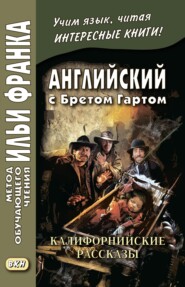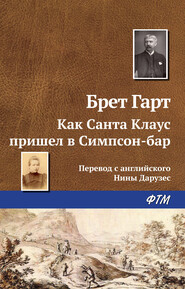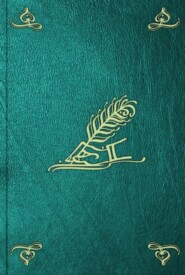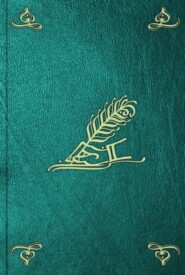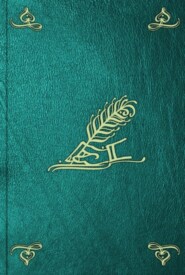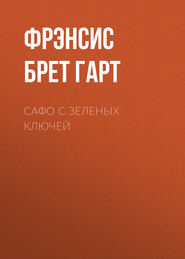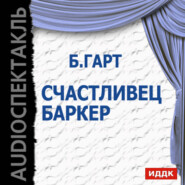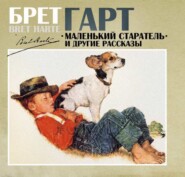По всем вопросам обращайтесь на: info@litportal.ru
(©) 2003-2024.
✖
Gabriel Conroy
Автор
Год написания книги
2017
Настройки чтения
Размер шрифта
Высота строк
Поля
For the first time during the interview Arthur awoke from his pre-occupation, and glanced keenly at Dumphy. "Of course," he returned, coolly, "I don't suppose you such a fool as to allow the only witness you have of your wife's death to be sacrificed – even if you believed that the impostor who was personating your wife had been charged with complicity in a capital crime and had fled from justice. You're not such a fool as to believe that this Mrs. Conroy won't try to help her husband, that she evidently loves, by every means in her power – that she won't make use of any secret she may have that concerns you to save him and herself. No, Mr. Peter Dumphy," said Arthur significantly; "no, you're too much of a business man not to see that." As he spoke he noted the alternate flushing and paling of Mr. Dumphy's face, and read – I fear with the triumphant and instinctive consciousness of a superior intellect – that Mr. Dumphy had been precisely such a fool, and had failed!
"I reckon nobody will put much reliance on the evidence of a woman charged with a capital crime," said Mr. Dumphy, with a show of confidence he was far from feeling.
"Suppose that she and Gabriel both swear that she knows your abandoned wife, for instance; suppose that they both swear that she and you connived to personate Grace Conroy for the sake of getting the title to this mine; suppose that she alleges that she repented and married Gabriel, as she did, and suppose that they both admit the killing of this Ramirez – and assert that you were persecuting them through him, and still are; suppose that they show that he forged a second grant to the mine – through your instigation?"
"It's a lie," interrupted Dumphy, starting to his feet; "he did it from jealousy."
"Can you prove his motives?" said Arthur.
"But the grant was not in my favour – it was to some old Californian down in the Mission of San Antonio. I can prove that," said Dumphy, excitedly.
"Suppose you can? Nobody imagines you so indiscreet as to have had another grant conveyed to you directly, while you were negotiating with Gabriel for his. Don't be foolish! I know you had nothing to do with the forged grant. I am only suggesting how you have laid yourself open to the charges of a woman of whom you are likely to make an enemy, and might have made an ally. If you calculate to revenge Ramirez, consider first if you care to have it proved that he was a confidential agent of yours – as they will, if you don't help them. Never mind whether they committed the murder. You are not their judge or accuser. You must help them for your own sake. No!" continued Arthur, after a pause, "congratulate yourself that the Vigilance Committee did not hang Gabriel Conroy, and that you have not to add revenge to the other motives of a desperate and scheming woman."
"But are you satisfied that Mrs. Conroy is really the person who stands behind Colonel Starbottle and personates my wife?"
"I am," replied Arthur, positively.
Dumphy hesitated a moment. Should he tell Arthur of Colonel Starbottle's interview with him, and the delivery and subsequent loss of the mysterious envelope? Arthur read his embarrassment plainly, and precipitated his decision with a single question.
"Have you had any further interview with Colonel Starbottle?"
Thus directly adjured. Dumphy hesitated no longer, but at once repeated the details of his late conversation with Starbottle, his successful bribery of the Colonel, the delivery of the sealed envelope under certain conditions, and its mysterious disappearance. Arthur heard him through with quiet interest, but when Mr. Dumphy spoke of the loss of the envelope, he fixed his eyes on Mr. Dumphy's with a significance that was unmistakable.
"You say you lost this envelope trusted to your honour!" said Arthur, with slow and insulting deliberation. "Lost it, without having opened it or learned its contents? That was very unfortunate, Mr. Dumphy, ve-ry un-for-tu-nate!"
The indignation of an honourable man at the imputation of some meanness foreign to his nature is weak compared with the anger of a rascal accused of an offence which he might have committed, but didn't. Mr. Dumphy turned almost purple! It was so evident that he had not been guilty of concealing the envelope, and did not know its contents, that Arthur was satisfied.
"He denied any personal knowledge of Mrs. Conroy in this affair?" queried Arthur.
"Entirely! He gave me to understand that his instructions were received from another party unknown to me," said Dumphy. "Look yer, Poinsett – you're wrong! I don't believe it is that woman."
Arthur shook his head. "No one else possesses the information necessary to blackmail you. No one else has a motive in doing it."
The door opened to a clerk bearing a card. Mr. Dumphy took it impatiently and read aloud, "Colonel Starbottle of Siskiyou!" He then turned an anxious face to Poinsett.
"Good," said that gentleman, quietly; "admit him." As the clerk disappeared, Arthur turned to Dumphy, "I suppose it was to meet this man you sent for me?"
"Yes," returned Dumphy, with a return of his old brusqueness.
"Then hold your tongue, and leave everything to me."
The door opened as he spoke to Colonel Starbottle's frilled shirt and expanding bosom, followed at a respectful interval by the gallant Colonel himself. He was evidently surprised by the appearance of Mr. Dumphy's guest, but by no means dashed in his usual chivalrous port and bearing. "My legal adviser, Mr. Poinsett," said Dumphy, introducing Arthur briefly.
The gallant Colonel bowed stiffly, while Arthur, with a smile of fascinating courtesy and deference that astonished Dumphy in proportion as it evidently flattered and gratified Colonel Starbottle, stepped forward and extended his hand. "As a younger member of the profession I can hardly claim the attention of one so experienced as Colonel Starbottle, but as the friend of poor Henry Beeswinger, I can venture to take the hand of the man who so gallantly stood by him as his second, two years ago."
"Ged, sir," said Colonel Starbottle, absolutely empurpling with pleasure, and exploding his handkerchief from his sweltering breast. "Ged! you – er – er – do me proud! I am – er – gratified, sir, to meet any friend of – er – er – gentleman like Hank Beeswinger! I remember the whole affair, sir, as if it was yesterday. I do!" with an oath. "Gratifying, Mr. Poinsett, to every gentleman concerned. Your friend, sir, – I'm proud to meet you – I am, – me! – killed, sir, second fire! Dropped like a gentleman, – me! No fuss; no reporters; no arrests. Friends considerate. Blank me, sir, one of the finest, d – me, I may say, sir, one of the very finest – er – meetings in which I have – er – participated. Glad to know you, sir. You call to mind, sir, one of the – er – highest illustrations of a code of honour – that – er – er – under the present – er – degrading state of public sentiment is er – er – passing away. We are drifting sir, drifting – drifting to er – er – political and social condition, where the Voice of Honour, sir, is drowned by the Yankee watchword of Produce and Trade. Trade, sir, blank me!" Colonel Starbottle paused with a rhetorical full stop, blew his nose, and gazed at the ceiling with a plaintive suggestion that the days of chivalry had indeed passed, and that American institutions were indeed retrograding; Mr. Dumphy leaned back in his chair in helpless irritability; Mr. Arthur Poinsett alone retained an expression of courteous and sympathising attention.
"I am the more gratified at meeting Colonel Starbottle," said Arthur, gravely, "from the fact that my friend and client here, Mr. Dumphy is at present in a condition where he most needs the consideration and understanding of a gentleman and a man of honour. A paper, which has been entrusted to his safe keeping and custody as a gentleman, has disappeared since the earthquake, and it is believed that during the excitement of that moment it was lost! The paper is supposed to be intact, as it was in an envelope that had never been opened, and whose seals were unbroken. It is a delicate matter, but I am rejoiced that the gentleman who left the paper in trust is the honourable Colonel Starbottle, whom I know by reputation, and the gentleman who suffered the misfortune of losing it is my personal friend Mr. Dumphy. It enables me at once to proffer my services as mediator, or as Mr. Dumphy's legal adviser and friend, to undertake all responsibility in the matter."
The tone and manner were so like Colonel Starbottle's own, that Dumphy looked from Arthur to Colonel Starbottle in hopeless amazement. The latter gentleman dropped his chin and fixed a pair of astonished and staring eyes upon Arthur. "Do I understand – that – er – this gentleman, Mr. Dumphy, has placed you in possession of any confidential statement – that – er" —
"Pardon me, Colonel Starbottle," interrupted Arthur, rising with dignity, "the facts I have just stated are sufficient for the responsibility I assume in this case. I learn from my client that a sealed paper placed in his hands is missing. I have from him the statement that I am bound to believe, that it passed from his hands unopened; where, he knows not. This is a matter, between gentlemen, serious enough without further complication!"
"And the paper and envelope are lost?" continued Colonel Starbottle, still gazing at Arthur.
"Are lost," returned Arthur, quietly. "I have advised my friend, Mr. Dumphy, that as a man of honour, and a business man, he is by no means freed through this unfortunate accident from any promise or contract that he may have entered into with you concerning it. Any deposit as a collateral for its safe delivery which he might have made, or has promised to make, is clearly forfeited. This he has been waiting only for your appearance to hand to you." Arthur crossed to Mr. Dumphy's side and laid his hand lightly upon his shoulder, but with a certain significance of grip palpable to Mr. Dumphy, who, after looking into his eyes, took out his cheque book. When he had filled in a duplicate of the cheque he had given Colonel Starbottle two days before, Arthur took it from his hand and touched the bell. "As we will not burden Colonel Starbottle unnecessarily, your cashier's acceptance of this paper will enable him to use it henceforth at his pleasure, and as I expect to have the pleasure of the Colonel's company to my office, will you kindly have this done at once?"
The clerk appeared, and at Mr. Poinsett's direction, took the cheque from the almost passive fingers of Mr. Dumphy.
"Allow me to express my perfect satisfaction with – er – er your explanation!" said Colonel Starbottle, extending one hand to Arthur, while at the same moment he gracefully readjusted his shirt-bosom with the other. "Trouble yourself no further – regarding the – er – er – paper. I trust it will – er – yet be found; if not, sir, I shall – er – er – " added the Colonel, with honourable resignation, "hold myself personally responsible to my client, blank me!"
"Was there no mark upon the envelope by which it might be known without explaining its contents?" suggested Arthur.
"None, sir, a plain yellow envelope. Stop!" said the Colonel, striking his forehead with his hand. "Ged, sir! I do remember now that during our conversation I made a memorandum, – me, a memorandum upon the face of it, across it, a name, Ged, sir, the very name of the party you were speaking of – Gabriel Conroy!"
"You wrote the name of Gabriel Conroy upon it! Good! That may lead to its identification without exposing its contents," returned Arthur. "Well, sir?"
The last two words were addressed to Mr. Dumphy's clerk, who had entered during the Colonel's speech and stood staring alternately at him and his employer, holding the accepted cheque in his hand.
"Give it to the gentleman," said Dumphy, curtly.
The man obeyed. Colonel Starbottle took the cheque, folded it, and placed it somewhere in the moral recesses of his breast-pocket. That done, he turned to Mr. Dumphy. "I need not say – er – that – er – as far as my personal counsel and advice to my client can prevail, it will be my effort to prevent litigation in this – er – delicate affair. Should the envelope – er – er – turn up! you will of course – er – send it to me, who am – er – personally responsible for it. Ged, sir," continued the Colonel, "I should be proud to conclude this affair, conducted as it has been on your side with the strictest honour, over the – er – festive-board – but – er – business prevents me! I leave here in one hour for One Horse Gulch!"
Both Mr. Dumphy and Poinsett involuntarily started.
"One Horse Gulch?" repeated Arthur.
" – me! yes! Ged, sir, I'm retained in a murder case there; the case of this man Gabriel Conroy."
Arthur cast a swift precautionary look at Dumphy. "Then perhaps we may be travelling companions?" he said to Starbottle, smiling pleasantly. "I am going there too. Perhaps my good fortune may bring us in friendly counsel. You are engaged" —
"For the prosecution," interrupted Starbottle, slightly expanding his chest. "At the request of relatives of the murdered man – a Spanish gentleman of – er – er – large and influential family connections, I shall assist the District Attorney, my old friend, Nelse Buckthorne!"
The excitement kindled in Arthur's eyes luckily did not appear in his voice. It was still pleasant to Colonel Starbottle's ear, as, after a single threatening glance of warning at the utterly mystified and half exploding Dumphy, he turned gracefully toward him. "And if, by the fortunes of war, we should be again on opposite sides, my dear Colonel, I trust that our relations may be as gratifying as they have been to-day. One moment! I am going your way. Let me beg you to take my arm a few blocks and a glass of wine afterwards as a stirrup-cup on our journey." And with a significant glance at Dumphy, Arthur Poinsett slipped Colonel Starbottle's arm deftly under his own, and actually marched off with that doughty warrior, a blushing, expanding, but not unwilling captive.
When the door closed Mr. Dumphy resumed his speech and action in a single expletive. What more he might have said is not known, for at the same moment he caught sight of his clerk, who had entered hastily at the exit of the others, but who now stood awed and abashed by Mr. Dumphy's passion. "Dash it all! what in dash are you dashingly doing here, dash you?"
"Sorry, sir," said the unlucky clerk; "but overhearing that gentleman say there was writing on the letter that you lost by which it might be identified, sir – we think we've found it – that is, we know where it is!"
"How?" said Dumphy, starting up eagerly.
"When the shock came that afternoon," continued the clerk, "the express bag for Sacramento and Marysville had just been taken out by the expressman, and was lying on top of the waggon. The horses started to run at the second shock, and the bag fell and was jammed against a lamp-post in front of our window, bursting open as it did so and spilling some letters and papers on the side-walk. One of our night watchmen helped the expressman pick up the scattered letters, and picked up among them a plain yellow envelope with no address but the name of Gabriel Conroy written in pencil across the end. Supposing it had dropped from some package in the express bag, he put it back again in the bag. When you asked about a blank envelope missing from your desk, he did not connect it with the one he had picked up, for that had writing on it. We sent to the express office just now, and found that they had stamped it, and forwarded it to Conroy at One Horse Gulch, just as they had always done with his letters sent to our care. That's the way of it. Daresay it's there by this time, in his hands, sir, all right!"
CHAPTER III.
GABRIEL MEETS HIS LAWYER
Gabriel's petition on behalf of Mr. Hamlin was promptly granted by the sheriff. The waggon was at once put into requisition to convey the wounded man – albeit screaming and protesting – to the Grand Conroy Hotel, where, in company with his faithful henchman, he was left, to all intents a free man, and a half an hour later a demented one, tossing in a burning fever.







